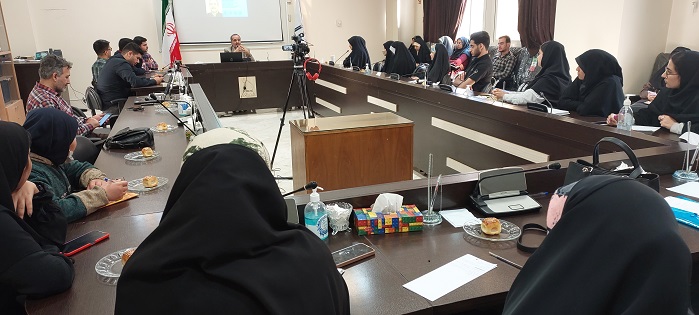Who is a leveled student of humanities? The subject of the first meeting of Hamgera Humanities School

The first meeting of the Hamgera Humanities School with the title "Leveled Student of Humanities" lectured by Dr. Adel Peyqami, the faculty member of Imam Sadiq University (AS) and a member of the Supreme Council of the Cultural Revolution and by the initiative of the Student Scientific Association of Islamic Studies in the Humanities, Ferdowsi University of Mashhad, was held in March 6, 2023 at the Research Institute of Islamic Studies in Humanities in Ferdowsi University of Mashhad.
At the beginning of the meeting, Dr. Adel Peyqami explained the essential differences between humanities and technical and medical sciences. He stated that humanities are along with other sciences and not within them; In other words, humanities is a foundation of other sciences and the weakness and power of countries in the world is rooted in their humanities. In addition, our growth and progress in various technical and medical fields is due to a human phenomenon called the Islamic Revolution.
He further pointed out the difference between the boundaries of knowledge in the humanities and other sciences and stated that these boundaries in the technical and medical sciences sometimes change annually or every six months, but the boundaries of the humanities remain even for several millennia. For example, in the concept of justice, we have both the literature of 2023 and the opinions of Plato 2300 years ago, both of which are at the border of knowledge at the same time. Therefore, the study of history in humanities, in spite of other sciences, is not like reading beautiful stories, but in the sense of scientific texts.
Emphasizing that separating the branches and trends of humanities as specialization in technical and medical sciences was and is a strategic mistake, this faculty member of Imam Sadiq University (AS) found the solution in separating and not simultaneously the branches or the types of combinations such as interdisciplinary and transdisciplinary, which is a very delicate and precise matter. He also added that the distance between theoretical and practical sciences in humanities is much greater than technical and medical sciences, and there is a separate literature in the world to equip the practical and applied part of humanities; however, unfortunately in our country only theoretical parts are presented.
In the second part of his speech, Dr. Peyqami discussed the characteristics of a humanities student. He stated that based on the essential differences between the humanities and other sciences, the student of this field of study must be very patient and have a long-term view, and added that none of the leading scholars in humanities saw what they created. In humanities, the first step of a student is to understand the many complexities of humanities and get out of absolute ignorance, and admit not knowing.
The member of the Supreme Council of the Cultural Revolution, while referring to the remark of John Stuart Mill, a philosopher and economist of the 19th century, who said: "Anyone who just know economics, does not know economics", emphasized the need for a student of humanities to be multidisciplinary. He stated that what we mean by a humanities student is a person who becomes a thinker in the humanities, otherwise this is not expected from humanities technicians as bank employee.
Finally, by likening the technology of thinking to software and the principle of thinking to the operating system in a computer, he expressed that unfortunately, students in university courses only learn software, but they do not have the operating system or the intellectual framework to use the software properly. Hence, for example, humanities students in the field of economics can use the books of Imam Musa Sadr and the book “Outline of Islamic thought in the Quran” by the Supreme Leader to strengthen their operating system.
In the continuation of the meeting, questions and answers were also raised.

